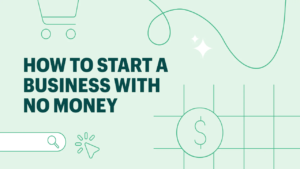How I Started Business Without Money? A substantial amount of cash is usually needed to launch a firm. However, starting a business may appear overwhelming to would-be business owners with little capital. But with a little bit of imagination, ingenuity, and careful preparation, it is totally feasible to launch a profitable business without any funding. I’ll discuss my own experience of building a company from the ground up without any initial funding in this post and offer helpful advice for anybody wishing to follow in my footsteps.
Skills You Need To Start Business Without Money
It’s not always necessary to be an expert in finance to launch a firm, even in the absence of funding. All you really need is a skill and the determination to persevere through difficult times. One gets money when they solve someone else’s difficulty. To overcome that obstacle, you’ll need a mix of money-making abilities such as:
- Marketing skills
- Writing skills
- Copywriting skills
- Social media skills
- Blogging / YouTube skills etc.
Acquiring all of these abilities at once is not required. Since I had previously worked in other organizations, marketing has always been my strongest suit, but I personally started with blogging. Whenever someone asks me for advice on how to launch a business without any money, I advise them to learn a talent that makes people’s troubles disappear.
Steps to Start Business Without Money
Here are the following steps to start business without money:
Identify Your Strengths and Passion:
Recognizing your hobbies, capabilities, and abilities is crucial before venturing into the field of business. Through the utilization of your current knowledge and passions, you may develop a company idea that complements your skills and appeals to your intended market. Regardless of the type of business—services, digital products, or specialized markets—concentrating on your strengths may provide the groundwork for a profitable endeavor.
Start Small and Validate Your Idea:
Instead of going for big ideas that would cost a lot of money, start small and concentrate on getting your company concept validated. This may include reaching out to prospective clients for comments, carrying out market research, or putting out a minimum viable product (MVP) to gauge interest. You may fine-tune your product and make sure it appeals to your target market before devoting a substantial amount of time or money by assessing interest and demand early on.
Utilize Free Resources and Tools:
Aspiring entrepreneurs have access to a wealth of free materials and tools in the current digital era. Use these resources—which range from social media sites and website builders to online classes and networking gatherings—to develop your brand and create a presence in the market without having to pay for anything up front. Make use of your professional and personal networks as well for assistance, direction, and possible joint ventures.
Bootstrap and Prioritize Cash Flow:
Bootstrapping is the practice of launching and expanding a business on one’s own dime, using sales proceeds, personal savings, and profits reinvested in the company. Successful bootstrapping requires putting cash flow management first and concentrating on revenue generation right away. To produce recurring income streams, this might entail developing digital products, providing services, or putting in place a subscription-based business model.
Embrace Lean Business Practices:
Early on in your enterprise, you may reduce expenses and increase efficiency by implementing lean business techniques. This entails managing a small staff, cutting down on administrative costs, and giving priority to projects that immediately result in increased income. You may stretch your resources farther and improve your prospects of long-term sustainability by keeping costs down and concentrating on the necessities.
Seek Strategic Partnerships and Barter Arrangements:
Look for barter and strategic partnership options that will be advantageous to all parties. By working together with firms that complement each other, trading goods for services, or utilizing common resources, strategic alliances enable you to get access to resources and knowledge that you would not have otherwise been able to afford.
Focus on Building Relationships and Providing Value:
When your firm is first getting started, concentrate on developing real relationships with your clients and offering great value. You may create organic growth and word-of-mouth referrals by providing great products or services and building a devoted client base. This will minimize the need for costly marketing and advertising campaigns.
Stay Nimble and Adapt to Change:
Since the business environment is always changing, successful entrepreneurs need to be flexible and quick to adjust. Be receptive to criticism, adjust your products in response to market demand, and change course as required to take advantage of new opportunities. You can set your company for long-term success in any economic environment by continuing to be flexible and adaptable.
Final Words of My Opinion:
Though difficult, starting a business without funding is totally doable with the correct attitude, strategy, and willpower. You may start a successful business without needing a sizable initial investment by embracing lean principles, using your abilities, confirming your idea, and using free resources. As you travel the entrepreneurial path, don’t forget to concentrate on adding value, developing connections, and remaining flexible. Regardless of your financial situation, you may realize your company aspirations with persistence and creativity.







